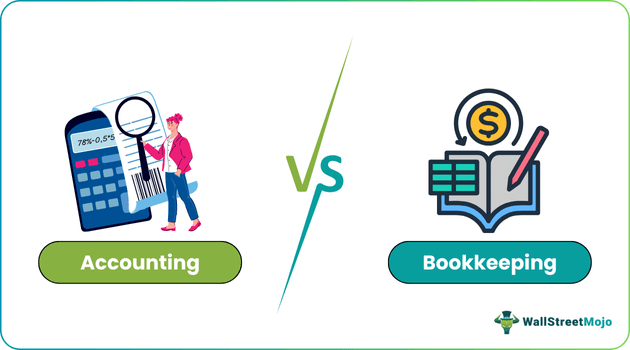The differences between both the concepts are given below:
Table Of Contents
Difference Between Accounting And Bookkeeping
The main difference between bookkeeping and accounting is how the financial transactions or data are treated. While bookkeeping tracks financial transactions daily, accounting is a systematic process of recording, evaluating and analyzing financial transactions of varied natures to derive necessary information from them. The scope and purpose of accounting are significantly broader when compared to bookkeeping.

Key Takeaways
- Accounting is evaluating and interpreting financial data, creating statements, and offering financial insights, while bookkeeping is recording daily transactions and maintaining financial records.
- Bookkeeping is part of accounting and provides the foundation for accurate financial records and information.
- Maintaining accurate financial records and analyzing and simplifying financial management requires both accounting and bookkeeping.
- Accounting includes a wider range of operations, such as financial analysis, forecasting,
- and strategic decision-making, whereas bookkeeping mostly entails transactional and administrative activities. Hence, accounting has a broader scope.
Comparative Table
| Key Points | Bookkeeping | Accounting |
|---|---|---|
| 1. Concept | Bookkeeping is the process of identifying and recording financial transactions. | Accounting is compiling, analyzing, and expressing an organization's financial data. |
| 2. Purpose | Bookkeeping aims to preserve an organized, chronological financial activity and transaction record. | Accounting compiles information on a company's operating performance and financial health. |
| 3. Focus | Bookkeeping largely focuses on documenting and organizing financial transactions. | Accounting focuses on analyzing, evaluating, and reporting financial information. |
| 4. Nature | Compared to accounting, bookkeeping is more transactional and administrative. | Accounting requires more in-depth analysis and judgment. |
| 5. Concern | Bookkeeping is more concerned with correct data entry and recordkeeping. | Accounting focuses on financial analysis, forecasting, and planning. |
| 6. Essence | Bookkeeping is a subset or one segment of the accounting system. | Accounting begins where bookkeeping ends. |
| 7. Result | The bookkeeping process provides data that is used as input for further accounting processes. | Accounting prepares financial statements that can be used to make defensible decisions. |
| 8. Analysis | Bookkeeping does not involve analyzing the financial data recorded. | Accounting involves the analysis and interpretation of the financial data that has been recorded. |
| 9. Performance Assessment | Bookkeeping does not show how the business is performing or its financial position. | Accounting shows how the business has been performing and conveys the financial position of the business. |
| 10. Role in Decision-Making | The information offered by bookkeeping is insufficient for making decisions. | The information received from accounting can be used by management to make critical decisions. |
What Is Accounting?
Accounting is a comprehensive process that involves interpreting, analyzing, summarizing, and reporting a business's financial transactions. It encompasses the preparation of accurate and concise financial statements that provide a detailed overview of a company's financial activities within a specific accounting period. These statements, which include the income statement, statement of cash flows, and balance sheet, summarize a company's financial position, operations, and cash flows. The primary goal of accounting is to consolidate financial information in a way that is understandable and easily interpretable by all stakeholders.
Businesses may monitor their financial health and make educated decisions by keeping timely, reliable records. An accountant plays a crucial role in compiling and organizing the company's daily transactions into financial statements. These statements serve as a tool for stakeholders to assess the company's performance and make strategic decisions based on the financial data presented. The process is the backbone of financial management by providing a comprehensive and reliable depiction of a company's financial activities.
As an accountant, one has to shoulder the responsibilities of auditing as well, which involve ensuring that the businesses for which the audits are being conducted follow ethical standards and they are not involved in any kind financial misstatement.
What Is Bookkeeping?
Bookkeeping is a process that tracks daily financial activities, such as purchases, receipts, sales, and payments. It plays a vital role in tracking and managing financial transactions. The process involves regularly updating records to monitor daily expenses, profits, and losses. This information helps in planning future transactions and assessing the performance of a business or company. Accurate bookkeeping is crucial for tax audits and enables informed decision-making for major investments.
Bookkeepers maintain these records, ensuring the reliability of financial information. The bookkeeping process involves identifying and recording transactions, preparing ledger accounts, and creating a trial balance to verify accuracy. The main focus of the process is to maintain the accuracy of all monetary transactions in a business. Bookkeepers maintain general journals and ledgers, monitor the accuracy of financial records, reconcile accounts, and create fundamental financial statements like income and balance sheets. A solid foundation for accounting analysis and reporting is provided by bookkeeping, which offers a clear and orderly record of financial activity.
Given the responsibilities that the bookkeepers handle and the accountability they hold, it is important for the individuals aspiring to become one to have an eye to detail and catch even the minutest mistakes in the recorded financial statements and other financial documents. They must have the ability to shift their focus as and when required.
Similarities
Bookkeeping and accounting are interdependent. The correctness of a business's accounting procedures depends upon the precision of bookkeeping. The similarities between accounting and bookkeeping include the following:
- Shared objective of maintaining accurate, reliable financial records, which facilitates financial management.
- Both processes include working with financial data, observing accounting standards and principles, and following all applicable rules and regulations.
- Both are essential for giving stakeholders access to financial data, facilitating decision-making, and preserving an organization's overall financial stability.
- Bookkeepers as well as accountants require having similar set of skills to an extent.
